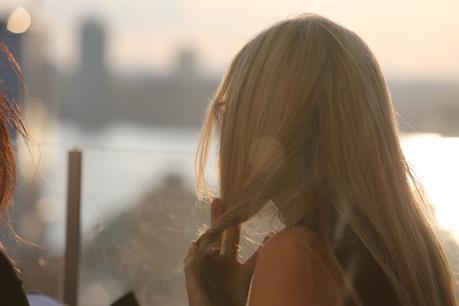
Beauty doesn’t equate to happiness
I was 10 years old the first time someone commented on my appearance in public. I was walking with a boy in my class down the narrow, dark street of East 86th street in New York City. As we reached the end of the street, the boy looked at me and said, “You’re going to be sexy when you’re older.”
I was surprised and a little baffled. The city itself already intimidated me: I had just moved from the suburbs of California and New York felt grand and confusing in comparison. But especially because the city was my new home, and as a generally insecure child, I desperately wanted to be part of this city full of exotic faces and tall boys.
I had only paid a tiny amount of attention to my appearance up until that point — only enough to replicate the hairstyles and fashion trends of celebrities dancing in MTV music videos. I was aware that “sexy” was a good thing, however, so when this boy validated that I had potential, it felt mollifying.
By 12, my looks were the first thing on my mind each day. I had catching up to do when it came to my appearance: My face was pale and blotchy from playing soccer in the sun and a girl at school pointed out that I had too much hair on my arms. I was part of a group of uncontrollably insecure middle schoolers who based our value on our looks. I developed an anxiety disorder and severe depression. I compared myself constantly to my peers and, when I chose to attend to class, would show up wearing belly shirts and coats of thick lipgloss. These insecurities grew increasingly heavy until I felt like I was dragging around a backpack as dense as rock.
By 14, I realized being considered “sexy” meant that boys would forget to ask me how I was doing, that I wouldn’t have to expose any part of myself to them. I found that if I wore tight dresses and straightened my hair, my peers seemed to like me more. I began messaging teen boys online for approval and validation and found out that older boy wanted to touch me. I failed my eighth grade classes because I equated dumbness to cuteness. I refused to eat during lunch because a girl in my class called me “curvy.”
By the time I hit 15, a deep numbness had settled in my stomach. I awoke one night feeling exhausted, as if my body had been slashed and then stapled back together. Perhaps I knew something was very wrong, but I ignored it.
The summer after my first year of high school, I discovered the “raw vegan” community on Tumblr and became a fruitarian (my diet consisted of only eating fruit and a few vegetables). I dropped 15 pounds in two weeks and my acne worsened. My mom took me to see my short-term psychologist who proclaimed that I was “fine.” I was fine.
By my senior year of high school, I slept 12 hours a day. I was subjected to dreams about my cramping stomach, massacres and hangings. I found myself getting lost in tragedies. I didn’t understand why I couldn’t just starve already. The concealer I wore to cover up the dark rings under my eyes and the mascara and pink blush I applied to convince people I was alive and healthy disgusted me. My illness convinced me that I had reached a point of clarity — that everyone else was perfect and I was ugly. I masked my feelings and had desperate urges to pull the plug, to shut myself off.
After I graduated high school, I enrolled in Emerson College in Boston. I had never felt worse about the way I looked and began to try to erase parts of myself. I threw away my journals and deleted my music blog. I refused to eat breakfast and dinner. I continuously reminded myself, “Once my skin is clear, I’ll be happy” and “Once I lose 20 pounds, I’ll feel better.” I found a new diet and became 100% vegan and gluten-free. I excluded myself from the friends I had made in school and made up excuses to not go places. I lied to myself, telling myself I’d be happier back home, and dropped out of college.
Self-acceptance is a tricky thing to chase. For quite some time, I fooled myself into thinking that being “sexy” would solve all my troubles, that I would fit in if only I was thinner and had the perfect makeup and a symmetrical face. But beauty doesn’t work that way. Perfection, like the kind I was trying to achieve, is impossible. Neither changing my actions nor my behaviors to achieve a standard of beauty ever made me sincerely happy. My immense desire to feel physically attractive, sexy, and accepted became so enormously powerful that it overtook my basic impulse to take care of myself.
Every day I try to discover my unique qualities. Sometimes, I still fake that attempt or even fake those qualities. But I’m trying. Other young girls are trying. I think that’s all we can do: try, and be honest about trying.
If you or someone you know is dealing with an eating disorder, visit the National Eating Disorders Association for information and resources. If you or someone you know is struggling with their emotional health, visit the National Suicide Prevention Lifeline or call 1-800-273-TALK (1-800-273-8255) to speak to someone.

